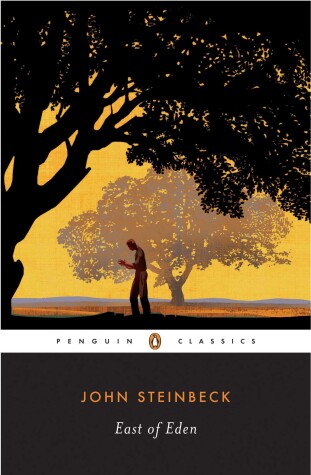
A masterpiece of Biblical scope, and the magnum opus of one of America’s most enduring authors
A Penguin Classic
In his journal, Nobel Prize winner John Steinbeck called East of Eden “the first book,” and indeed it has the primordial power and simplicity of myth. Set in the rich farmland of California’s Salinas Valley, this sprawling and often brutal novel follows the intertwined destinies of two families—the Trasks and the Hamiltons—whose generations helplessly reenact the fall of Adam and Eve and the poisonous rivalry of Cain and Abel.
The masterpiece of Steinbeck’s later years, East of Eden is a work in which Steinbeck created his most mesmerizing characters and explored his most enduring themes: the mystery of identity, the inexplicability of love, and the murderous consequences of love's absence. Adapted for the 1955 film directed by Elia Kazan introducing James Dean and read by thousands as the book that brought Oprah’s Book Club back, East of Eden has remained vitally present in American culture for over half a century.
This edition features an introduction by David Wyatt.
For more than seventy years, Penguin has been the leading publisher of classic literature in the English-speaking world. With more than 1,800 titles, Penguin Classics represents a global bookshelf of the best works throughout history and across genres and disciplines. Readers trust the series to provide authoritative texts enhanced by introductions and notes by distinguished scholars and contemporary authors, as well as up-to-date translations by award-winning translators.
My friend Melanie, in her review of East of Eden, in the praise of its heart and complexity and humor, wrote about the surprise of it, how it staggered her because she’s never been big on Biblical themes. In the comments, I said how much I needed to re-read it, how I do love some sweeping Biblical themes. And I do. So much. I’ve wondered, is it the holdover from my childhood? I’d read the Bible something like three times all the way through by the time I was fourteen, and a couple dozen more times than that for all the good parts. I’m not what you could exactly call religious any more, and still: there’s something there that gets to the quick, true pulse of me faster than the rest. Talk Abraham. Talk Isaac. Talk Abel and Cain. There’s my heart beating a little faster. There’s me leaning in to pay attention with more of a gleam than I had before.
Steinbeck, here, is taking a good stab at the answer.
We believe a true story, and we know a true story when we hear it. As simple as that— and as desperately complicated. (We can borrow Cathy’s point for a moment, where the best lie of all is the truth.) All novels, all poetry, there isn’t any other story. Told a thousand times before a thousand years ago, the oldest and only story in the world. Our own. It’s about us or we wouldn’t listen. It’s about everyone, or it wouldn’t last. What Lee says here, with relief:“This is not theology. I have no bent towards gods. But I have a new love for that glittering instrument, the human soul. It is a lovely and unique thing in the universe. It is always attacked and never destroyed— because ‘Thou mayest.’”
“Thou mayest!” Steinbeck recasts the Bible and what he writes is the Bible— the giant-hearted, joyful outcasts and sinners, the blood ties and brotherhood, the sacrifices and betrayals, the devils right alongside the angels. (In true Steinbeck fashion: “It would be absurd if we did not understand both angels and devils, since we invented them.”) It’s the kind of book I love best. The books that have got all of life in them. Sometimes they’re short. Sometimes they’re long. Sometimes they’re a day; sometimes they’re generations. This one is generations. From page 4 and the Salinas, the part-time river, to page 600 and Lee determining we all have the right to pain. It’s like Cal, our own Cain, crammed full to the top with every good and every bad thing.
And I think, if a book like East of Eden is so widely read, and so widely loved, and one of the greatest books of our recent history: that’s a world I can’t be cynical about. Not a bit. If it endures a fraction as long as the Bible and our other mythology? It will be because it’s the same story as any of them. Not divine: utterly, wonderfully, fearfully, inescapably human. All we ever are. All we will be. And we’ll read it always because it’s not foreign or strange: it’s ourselves.
“And now—” my favorite line in maybe the whole damn book, my sweet Abra and beloved Cal and beloved Lee— “now that you don’t have to be perfect, you can be good.”
(I picture the laughing Samuel Hamilton, his world tumbled by one of Lee’s thoughts: “Let me alone— let me think! Your damned bitch is having pups in my brain already.”)
Reading updates
-
Started reading
-
7 July, 2013:
Finished reading
-
7 July, 2013:
Reviewed
-
Started reading
-
Finished reading
-
7 July, 2013:
Reviewed
